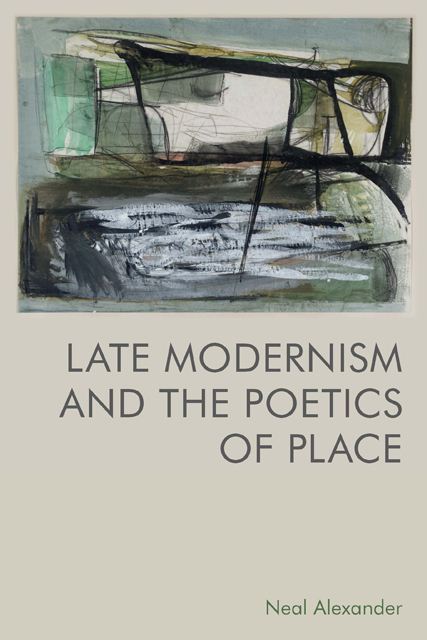Book contents
- Frontmatter
- Contents
- Acknowledgements
- Introduction
- 1 David Jones: The Sites of History
- 2 Basil Bunting’s Regional Modernism
- 3 W. S. Graham: Between Places
- 4 Lorine Niedecker: Life by Water
- 5 Charles Olson’s Mappemunde
- 6 Gwendolyn Brooks: From Bronzeville to the Warpland
- Conclusion: After Late Modernism
- Notes
- Bibliography
- Index
1 - David Jones: The Sites of History
Published online by Cambridge University Press: 18 November 2022
- Frontmatter
- Contents
- Acknowledgements
- Introduction
- 1 David Jones: The Sites of History
- 2 Basil Bunting’s Regional Modernism
- 3 W. S. Graham: Between Places
- 4 Lorine Niedecker: Life by Water
- 5 Charles Olson’s Mappemunde
- 6 Gwendolyn Brooks: From Bronzeville to the Warpland
- Conclusion: After Late Modernism
- Notes
- Bibliography
- Index
Summary
History and geography, place and memory, territory and myth are intricately intermeshed in the poetry of David Jones. Jones's distinctive historical sense – his perception ‘not only of the pastness of the past, but of its presence’ – is grounded in and given expression by a geographical imagination in which the concepts of place, site, and locality are of central importance. He explicitly characterises the poet's role as that of a ‘rememberer’ whose business is ‘to keep open the lines of communication’ with the past, and describes poetry itself as an act of ‘recalling’ or ‘anamnesis’. This act of anamnesis by which history is both recalled and represented is predicated upon an engagement with the material and symbolic qualities of particular places. Hence Jones's conception of the poet as a kind of archaeologist and bricoleur, whose synthesising creative imagination draws upon the cultural materials that ‘happen to be lying about the place or site or lying within the orbit of [his or her] “tradition” ’. The particular places and cultural traditions with which Jones's poetry is most deeply concerned are those of Britain, and especially Wales; although his aesthetic sensibility is broadly congruent with that of European modernism. Neil Corcoran argues persuasively that Jones's major literary achievement derives from his success in ‘localising, or domesticating, in a specifically British context, a modernist sense of the relation between a poet and his “tribal” history’. However, it is important to note that his imagination is also temporally and spatially expansive, taking in the whole of Western Europe from the time of the Roman Empire to the middle of the twentieth century, and ranging from the Eastern Mediterranean to the continent's North Atlantic archipelago. Indeed, Jones's most ambitious long poem, The Anathémata, reaches far back into prehistory and geological time in its exploration of the fundamental links between art and religion, culture and place.
Although he claimed to be a poor scholar, Jones's formidably erudite and allusive long poems are informed by wide-ranging and eclectic research, including a keen amateur interest in the disciplines of geography, oceanography, and geology. His library, now held at the National Library of Wales, includes volumes such as John Gorton's Topographical Dictionary of Great Britain and Ireland (1833), Halford Mackinder's Britain and the British Seas (1902), L. Dudley Stamp's The World: A General Geography (1940), and A. E. Trueman's Geology and Scenery in England and Wales (1961), among many others.
- Type
- Chapter
- Information
- Late Modernism and the Poetics of Place , pp. 21 - 51Publisher: Edinburgh University PressPrint publication year: 2022



